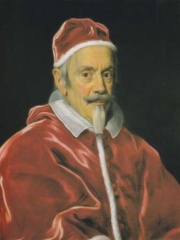
Pope Innocent VI was the fifth pope to live at Avignon, France, rather than Rome, Italy. It all started when Pope Boniface was kidnapped and tortured at his summer home just outside Rome in 1303. The Roman citizens were wild and chaotic. The popes just could not operate in that environment. After several years of wandering, the current pope decided to settle in the southern French town, not too far from the Mediterranean Sea.
Born Etienne Aubert sometime in the mid- to late-1280s, he grew up in a small town in Limousin, south-central France. As an adult, he taught civil law at the University of Toulouse. He was given various benefices: the bishop of Noyon in northern France in 1338, the bishop of Clermont in 1340, cardinal-priest of Sts. John and Paul in 1342. In September 1347, he was assigned to accompany Cardinal Annibaldo as part of a peace envoy to end the fighting of the French and English. Eventually, this became the Treaty of Calais in 1360. In February 1352, Pope Clement VI made Etienne cardinal-bishop of Ostia and Velletri, not too far from Rome.
The Papacy
Pope Clement died within the year and Etienne was voted in as the next pope. The cardinals had voted themselves a financial bonus at that time. Right after the coronation, on December 18, the new Pope Innocent VI began his changes. Not only did he end the cardinals’ view of their own superiority, he also made it clear to the many ecclesiastics who came looking for a handout that they should go back to their own sees and live there. Innocent limited the number of benefices one bishop could have. And then he began the clerical and monastic reforms. The Spiritual Franciscans, who believed in extreme poverty, had not completely died out. Innocent was very strict in his handling of these monks. St. Brigid of Sweden called him a persecutor of Christians for his stance.
Avignon was now a large city of 40- to 50,000 people. It was a center for the arts, for mercantile activities and financial transactions. Popes John XXII and Benedict XII had built the palace of popes and furnished it. Clement VI had enlarged and decorated it to surpass anything in Western Europe. The continuing war with the Roman counts plus the caring of the sick during the plague had emptied the coffers. The papacy was in financial trouble. Within a few years, Pope Innocent had to cry poverty. He had to sell precious works of art and reduce the staff in an attempt to stay afloat.
In 1354, Innocent, who had the plan to eventually move the curia back to Rome, sent Cardinal Albornoz and Cola de Rienzo to Rome to restore order. It did not work. Rienzo was killed in a riot in October. Innocent died before he could get negotiations to succeed.
The next year, Charles IV of Bavaria was elected Holy Roman Emperor. Charles wanted to be crowned emperor in Rome. Innocent was not going to go, considering how welcome his envoys were. But he permitted Charles to go there for the coronation, with the stipulation that Charles leave the same day he was crowned. Charles obeyed.
Meanwhile, in the Byzantine Empire, the child emperor John V Paleologos had a regent until his majority. When he was 15, the regent, also a John, made himself co-emperor, taking the name John VI. Within a few years, John V turned to Pope Innocent with a plan. If Innocent sent troops and take John VI down, John V would submit to the authority of the Pope and the whole empire would join him. The papacy was in poverty by this time and Innocent had nothing to offer. John V eventually found help elsewhere. And even though he eventually converted, few others did.
Although Innocent did manage to handle some problems, there were others he was not successful in. By 1360, “freebooters” were roaming, looting and attacking in southern France. Innocent ordered Avignon to be further fortified. Before the work was complete, the town was attacked, and the pope was made to pay a large ransom. He had no luck bringing peace to Castile and Aragon. The peace that came with the Truce of Calais expanded the English claim of French soil, temporarily. Within nine years, the war started again. Innocent’s dream of another crusade to the Holy Land did not come to fruition.
Internal link: www.lanternariuspress.net/pope-clement-vi-defender-of-authority/
External link: www.catholic365.com/article/30856/pope-innocent-vi-the-199th-pope.html

Recent Comments